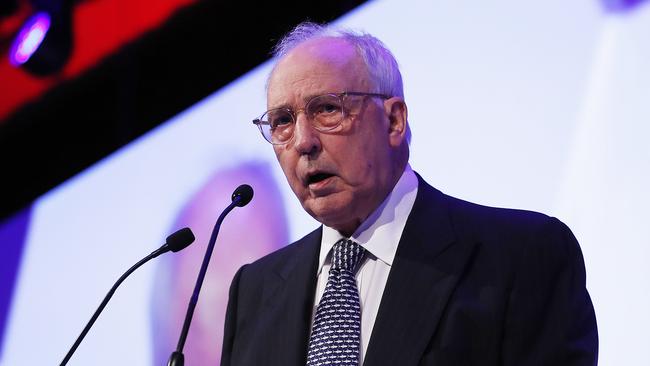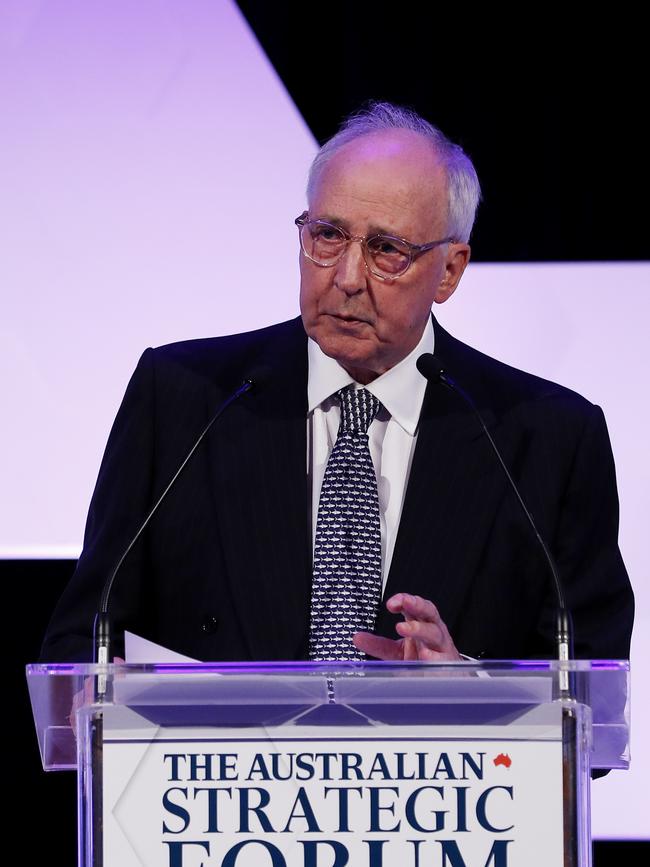Paul Keating’s blast: foreign policy on China ‘lacks realism’
Paul Keating warns the nation’s foreign policy lacks ‘any strategic realism’.

Paul Keating has criticised Canberra’s handling of the China relationship, warning that the nation’s foreign policy lacks “any strategic realism” and leaves Australia vulnerable in the Asia-Pacific, as Donald Trump’s America retreats.
In a keynote address to The Australian’s Strategic Forum in Sydney on Monday, the former prime minister called on foreign policymakers to focus on helping “divine a new construct” that engages with China but prevents it from dominating the region.
“Big states are rude and nasty but that does not mean you can afford not to deal with them, whether it be the United States or China,” said Mr Keating, who led Australia’s pivot towards Asia in the 1990s.
READ MORE: Keating, experts dish out a series of brutal truths, writes Paul Kelly | Foreign policy leaves us exposed to China: Keating | China in cold on human rights | Focus on China risks ignoring economic potential, writes Paul Maley | Labor ‘more hawkish’ against Beijing| MPs’ ban a ‘public relations failure’ | Pressure to put patrionism first | ‘Nothing to fear’ from communist influence
His critique was echoed by former chief of the army Peter Leahy, who warned that Australia had been left “pants down” in responding to China’s assertiveness in the South China Sea. “They are ahead of us in the South China Sea,” General Leahy said.
He backed Mr Keating’s assessment that Australia was a “strategy-free zone” compared with the long-term thinking of the Chinese leadership. He said Australia’s goal must be to ensure a conflict with China that many assumed likely did not happen.
In a conference peppered by a wide exchange of views, Treasurer Josh Frydenberg admitted “global norms” were under stress and collective efforts were needed to resolve trade tensions.
The former head of the Department of Prime Minister and Cabinet, Martin Parkinson, said China’s rejection of travel visas for two Australian MPs was a sign of diplomatic “immaturity”.
But ANZ chairman and University of NSW chancellor David Gonski sounded a positive note, calling on businesses to “savour” the opportunities presented by co-operating with China.
Former Defence Department secretary Dennis Richardson said Australia was “on the right track, and the government has not been sitting back, doing nothing”.
He dismissed the need for a grand plan, saying such a thing did not exist in the real world. “Policy management does and we do that pretty well,” he said.
But in a video interview shown at the forum, Steve Bannon, former chief strategist to Mr Trump, warned against keeping a constructive relationship with China. “We have to confront this totalitarianism,” he said.
“People in Australia need to understand that as this thing goes forward and it evolves from an information and economic war, it is going to a kinetic war.”
Mr Frydenberg rejected Mr Keating’s claim of a US withdrawal from the Asia-Pacific region, which the former Labor prime minister said would have happened even if Mr Trump had not been elected.
“As we sit here today, there are tens of thousands of American military personnel who are deployed in our region,’’ the Treasurer said. “Yes, Donald Trump, some of the time his language is different from his predecessors’, but I think the fundamental position of the United States is it values the partnerships in our part of the world and will stay engaged.”
Mr Frydenberg said he remained hopeful of a trade deal between China and the US to ease geopolitical tensions that had risen under Mr Trump and Chinese President Xi Jinping. “History shows that we shouldn’t get our expectations up, but at the same time I think the words from both the US and China are more encouraging than in the past,” Mr Frydenberg said.

“Certainly the mood around the table among G20 nations was, unless China and the US can resolve these differences, we will see a negative impact on global economic growth as well as business investment and sentiment. The feedback is that business is withholding from making decisions because of the uncertainty that these trade tensions are creating.”
Mr Frydenberg said it was critical the global rules-based order was restored amid a breakdown in the participation in multilateral institutions. “Global norms, regional architecture, the rules-based trading system is under stress. And this is going to take a collective effort,” the Treasurer said.
Mr Keating, who sits on the board of the Chinese Communist Party-controlled China Construction Bank, said the debate on China had “remarkably degenerated” in Australia and the “whispered word ‘communism’ of old is now being replaced by the word ‘China’”.
He said critics had attempted to undermine China’s rise as the “preponderant Asian economic power”, claiming it had ulterior motives and was not a democracy.
“Well, god help us if we are limited or slated to deal only with democracies,” Mr Keating said.
Highlighting the role of Russia in helping to defeat Nazi Germany, he added: “That policy would, without doubt, have lost us the Second World War.”
Mr Keating praised Mr Trump for seeking to avoid a military conflict with China that some in the defence establishments of the US and Australia wanted, saying the President’s instincts were “particularly good”.
“He is nonetheless not personally able to divine a new international agenda,” Mr Keating said. “He will not be constructing a new world model.”
The former prime minister said Australia had choices it could make in foreign policy but it could not ignore the biggest shift in economic power in world history.
“It is the national interest and its long-run trajectory which should guide our hand and not the nominally pious belchings of ‘do-gooder’ journalists who themselves live on leaks of agencies unfit to divine a national pathway,” he said.
Mr Keating warned the US was unlikely to return to its former influence, regardless of who won the next election. “Indeed, I think it is fair to say that following this presidency, the United States will not return to being the state it was.”




To join the conversation, please log in. Don't have an account? Register
Join the conversation, you are commenting as Logout